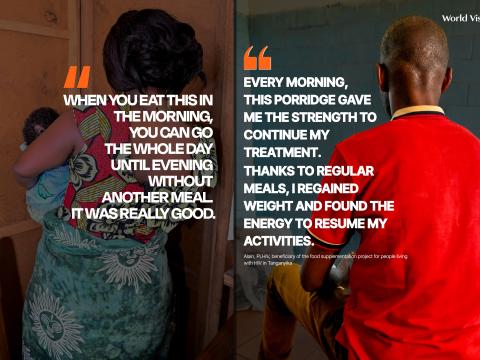DR Congo: Beyond Survival: How Nutrition Restores Dignity for People Living With HIV

Living with HIV is already a daily struggle. When malnutrition is added to the equation, the weight becomes almost unbearable. Between February and August 2024, a food supplementation project was implemented in the health zones of Kalemie, Nyemba, Moba, and Kansimba, with support from the World Food Programme (WFP). Its goal: to improve the nutritional status of people living with HIV (PLHIV) on antiretroviral therapy (ART) who were also battling moderate malnutrition. The project targeted the areas of Tanganyika province most affected by malnutrition and HIV. In Kalemie, 55% of health zones were covered; in Nyemba, 62%; in Moba, 48%; and in Kansimba, 52%. In total, 51 health facilities identified and enrolled nearly 6,600 moderately malnourished PLHIV into the program. Each received six months of nutritional support, enough time to make a tangible difference in their health and lives. Beyond numbers and statistics, the real impact of this initiative is written on the faces and in the voices of those who regained strength, dignity, and hope.
Alain, soldier and father of five:
“I regained weight, I regained my life.”
At 40, Alain has spent years serving his country in the military. Married and a father of five, his life was turned upside down in January 2022 when, after donating blood for his sick daughter, he learned he was HIV-positive. It was a devastating shock—but his wife chose to stand by him. Placed on ART, Alain then benefited from the project: every month for six months, he received fortified flour and oil.
“Every morning, I ate porridge that gave me the strength to continue my treatment. I went from 55 to 60 kg.”
Proper meals eased the dizziness caused by medication on an empty stomach. Today, Alain stands tall again, back in uniform, serving with renewed energy.
Nadège, teacher and young mother:
“With this porridge, I can teach without collapsing.”
At just 32, Nadège carries both the responsibility of shaping young minds and the heavy burden of HIV. She discovered her status during prenatal care, but thanks to early management, her baby was born HIV-negative. Still, her secret weighs on her shoulders, especially since she separated from her partner. Her biggest enemy was fatigue, worsened by breastfeeding and ART. That is, until fortified porridge entered her life.
“When you eat this in the morning, you can go the whole day until evening without another meal. It was really good.”
Thanks to this nutritional support, she kept her strength, avoided weight loss, and continued teaching while caring for her newborn.
Amélie, mother of six:
“Without this porridge, I wouldn’t have made it.”
At 42, Amélie knew only hardship. Repeated respiratory crises led to the diagnosis of HIV. Coming from a poor household, she could barely afford to eat properly, let alone follow a demanding treatment. The project became her lifeline. In six months, her weight rose from 56 to 61 kg, and her energy returned.
“The doctor took the time to reassure me. This porridge gave me the energy to take care of my children.”
For Amélie, nutritional aid wasn’t just food; it was survival, a chance to continue being the pillar her children needed. Mrs. Isabelle, Head of VCT Services:
“This support motivates patients to return.”
As head of the Voluntary Counseling and Testing (VCT) service, Mrs. Isabelle oversees over 400 patients, including 17 children. Since the project began, she has witnessed a remarkable change.
“Before, some dropped out due to a lack of food. Today, they come back because they feel better and also because they receive something tangible.”
The food aid reduces the side effects of ART, she explains, and most importantly, restores hope. This project proves that the fight against HIV cannot be separated from the fight against malnutrition. In just six months, it strengthened bodies, renewed spirits, and rekindled dignity. By combining nutritional assistance with medical care, this initiative has shown that resilience is possible and that people living with HIV can not only survive but thrive.
*Names used in this article have been changed to ensure beneficiary confidentiality.